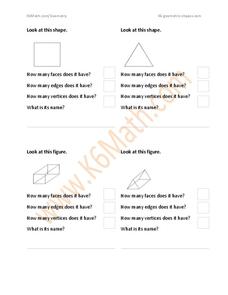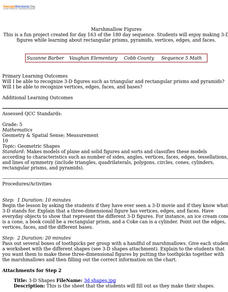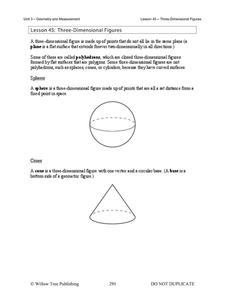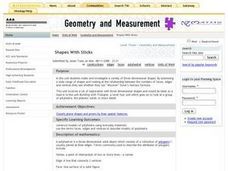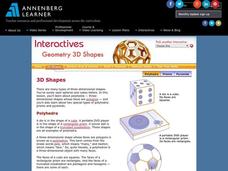Curated OER
Classifying Three-Dimensional Shapes
Compare geometric solids based on their properties. Your emergent geometers use spaghetti and marshmallows to build models so they can examine the number of faces, edges, and vertices on polyhedra of their own creation. Resource includes...
Curated OER
Prisms, Pyramids, and Nets
Students compare and contrast the characteristics of prisms and pyramids. In groups, they are given different colored construction paper to make rectanglar prisms. They identify the shapes of the faces and record the number of faces,...
Curated OER
Faces, Edges, and Vertices
In this solid figures activity, students learn to identify solid figures by their faces, edges, and vertices. Students solve six word problems about the solid figure characteristics.
Scholastic
Study Jams! Edges, Faces, Vertices
Before determining the classification of a three-dimensional shape, you need to know about the characteristics of a vertex, edge, and face. Go step-by-step using a prism, and discover what each aspect refers to and how it applies to...
Curated OER
Geometric Shapes and Figures
Are your mathematicians figuring out the difference between shapes and figures? Using a simple, visual identification worksheet, students analyze 2 shapes and 2 figures, answering 4 questions about each. Learners determine their...
Curated OER
Finding Patterns in Pyramids and Prisms
In this finding patterns in pyramids and prisms worksheet, 4th graders use two tables showing faces, edges and vertices for pyramids and prisms to answer six questions about the patterns.
Curated OER
Polyhedra: Faces, Edges, and Vertices (3-D Marshmallow Models)
Third graders explore the attributes of 3-dimensional shapes. In this shapes lesson, 3rd graders examine faces, edges, and vertices of 3-dimensional shapes as they construct shapes using marshmallows and toothpicks.
Curated OER
Marshmallow Figures
Students enjoy making 3-D figures while learning about rectangular prisms, pyramids, vertices, edges, and faces. After a lecture/demo, students use marshmallows, toothpicks and a worksheet imbedded in this lesson to create 3 dimensional...
Curated OER
Visualize 3-D Objects and Make Nets of Common Solids
Prisms are the focus of this geometry worksheet. Students count the number of parts of a prism and chart 26 answers. Vocabulary such as: "faces," "edges," and "verticies" are taught. A well-designed math worksheet!
Willow Tree
Three-Dimensional Figures
Time to move into the third dimension! Learn the names of the geometric solids and count faces, edges, and vertices. Then learn to recognize nets that create a given solid.
Curated OER
Marshmallow Geometry
In this three-dimensional shapes geometry lesson, learners identify geometric solids and name their properties. They define "face," "edge," and "vertex," and construct geometric solids using marshmallows as vertices and toothpicks as edges.
Curated OER
Properties of 3-D Shapes
In this properties of 3-D shapes worksheet, students fill in a chart that describes 5 shapes such as a cube, a rectangular prism, and a cylinder. They tell if the shape is a prism, and how many faces, edges, and vertices it has.
Curated OER
Shapes with Sticks
Third graders investigate three dimensional shapes. They examine a variety of shapes and the relationship between the number of faces, edges, and vertices. Students determine Euler's formula and they create a variety of three dimensional...
Houghton Mifflin Harcourt
Unit 6 Math Vocabulary Cards (Grade 5)
Acute angles, nets, and vertices are only a few terms that a set of flash cards includes. Among the 108 cards, two types are available; word cards printed in bold-faced lettering, and corresponding definition cards equipped with an...
Curated OER
Polyhedra
Seventh graders explore the characteristics of three-dimensional figures. They compare the nets of figures. Students describe the relationship between the nets draw and the solid. They identify the vertices, edges and faces of the...
Curated OER
Pyramids & Prisms: Guler's Formula
Sixth graders compare and contrast two-dimensional shapes to three-dimensional shapes. After watching a demonstration, they make their own shapes using nets printed on paper. To end the instructional activity, they use the shapes they...
Curated OER
Volume and Surface Area of Right Rectangular Prisms
Learners identify the formulas for three-dimensional figures. They use manipulatives to model problems. Students create foldables and explain volume and surface area. Learners complete worksheets and classify solids. Students sing a...
Curated OER
Faces, Vertices, Edges
Students identify the parts of three dimensional objects. In this geometry lesson, students find the number of faces, edges and vertices. They differentiate between prisms and polyhedra.
Curated OER
3-D Attributes
Students explore geometric solids. In this geometry instructional activity, students listen to the book The Greedy Triangle by Marilyn Burns, then work in groups to sort geometric solids into various categories. Students define geometric...
Curated OER
Euler's Theorem
In this Euler's Theorem worksheet, 10th graders solve and complete 15 various types of problems. First, they find the distance and midpoint of a segment given its endpoints. Then, students identify the number of vertices, edges, and...
Curated OER
The Geometry of Solids
In this solids worksheet, students compute the volume of prisms, cylinders, pyramids, spheres and cones. This seven-page worksheet contains approximately 68 problems.
Annenberg Foundation
Geometry 3D Shapes: Euler's Theorem
How do you get a theorem named after you? Euler knows what it takes! The third lesson of five asks pupils to use an interactive activity to compare the faces, vertices, and edges of seven different three-dimensional solids. They use...
Annenberg Foundation
Geometry 3D Shapes: 3D Shapes
Explore vocabulary related to three-dimensional shapes. An instructional website describes the characteristics of different geometric solids. Learners can use an interactive component to view nets, faces, vertices, and edges of common...
Curated OER
Solid Figures homework 17.1
In this identifying solid figures worksheet, students name each solid figure, write the number of faces, vertices, and edges, and solve a word problem. Students solve seven problems.






